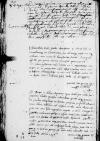Letter #1516
Ioannes DANTISCUS to [Kaspar HANNAU]Löbau (Lubawa), 1536-07-22
Manuscript sources:
Auxiliary sources:
Prints:
| ||||||||
Text & apparatus & commentary Plain text Text & commentary Text & apparatus
Salutem.
Accepi iis diebus aliquoties tuas litteras, quae mihi fueru[nt] una cum libellis excussis admodum gratae, utque quantum potes, scribas frequentius, te hortor. Praeterea, si quid ad vos de novis libris adfectui ab
